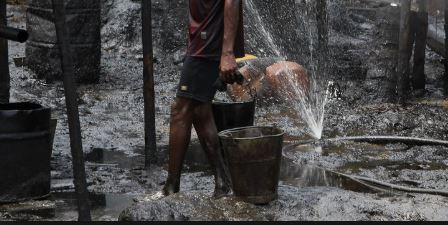Rating Summary
Abundant natural resources should have been a source of prosperity and development; rather, the host communities have suffered from pollution which is an indictment on oil-producing firms and the Ministry of Environment.

The House of Representatives Joint Committees have disclosed that the oil-producing communities in Nigeria have experienced environmental degradation and socio-economic marginalisation following decades of oil exploration and exploitation.
The Joint Committees comprising Environment, Petroleum Resources (Upstream), Petroleum Resources (Downstream), and Climate Change further explained that land degradation, loss of biodiversity, and deterioration of traditional livelihoods are inestimable and irreparable.
The Committee, led by Rep. Julius Pondi (Bayelsa, PDP), said abundant natural resources should have been a source of prosperity and development; rather, the host communities have suffered from pollution which is an indictment on oil producing firms and the ministry of environment.
These concerns were raised at the public hearing on the need to investigate the service and unprecedented environmental damage within oil-producing communities in Abuja on Wednesday.
Pondi in his remarks pointed out that the idea of maintaining basic principles of environmental protection, social equity, and corporate accountability was enshrined in the Nigerian law but despite the laws and regulations enacted to safeguard the Nigerian environment and the established regulatory agencies of the government that are mandated to address these concerns, the environmental damages in oil-producing communities still persist unabated.
He said it is incumbent on them, as representatives of the people, to identify the erring organizations, hold those responsible accountable, and take decisive action to mitigate the living conditions of the constituents.
The Joint Committee chairman noted that the hearing is not intended to witch-hunt any company but to have clarity on the matter that has been brought to the attention of the committees and the House of Representatives as he stressed the need to approach the inquiry with empathy and humility, making it possible for all to have reconciliation at the forefront.
“You may recall that the committee was constrained to adjourn a sitting at the hearing of April 24, 2024, to today due to the absence of a significant number of the invited stakeholders.
“Prior to today’s hearing, the committees, in continuation of the investigation, held a session with the oil-producing communities on Tuesday, May 7, 2024.
“The significance of the session was to listen to the concerns of those who have suffered environmental damages occasioned by non-compliance with existing laws by oil-producing companies and ensure that they are heard and respected.
“This hearing presents us with another opportunity in our nation’s quest for environmental justice and sustainable development as we convene here to address the pressing issue of environmental damages within oil-producing communities.
“In the debate leading to the above resolution, the House took into cognizance that the revenue generated from oil and gas exports forms a substantial portion of the government’s income and is utilized in the funding of critical sectors of our economic development.
“Nonetheless, there is a need to strike a balance between our economic prosperity and maintaining an ecosystem and the natural habitat that has served as home to all for millions of years.
“Our environment is not just the backdrop of human action but the very essence of life and our sustenance. The oil-producing communities in our nation have experienced environmental degradation and socio-economic marginalization as a result of decades of oil exploration and exploitation.
“The bountiful natural resources should have been a source of prosperity and development, but instead of prosperity, these communities have instead suffered from pollution, land degradation, loss of biodiversity, and deterioration of traditional livelihood,” he said.
